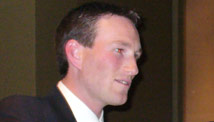By Josh Fryday, Special to CNN
December 9, 2010 12:02 p.m. EST
Editor's note: Josh Fryday, a judge advocate general (JAG) in the U.S. Navy, stationed in Japan, worked on John Edwards' campaigns for the presidential nomination in Raleigh, North Carolina, in 2004 as the national youth and volunteer director and in 2008 as head of the campaign in Northern California. He also traveled with Elizabeth Edwards as an aide during the Iowa primary in 2008.
Charlottesville, Virginia (CNN) -- A few months ago I had the opportunity to say goodbye to Elizabeth.
Knowing her time was limited, Elizabeth Edwards visited Japan, where I am stationed, to show her children where she spent much of her childhood. She had endless fond memories. Her father and family had been stationed here with the Navy.
It was unclear whether she would be healthy enough to make the trip, but right before she came she wrote me, apologizing for being disorganized, and asked if we would have time to see her. The last time I had seen her was at her home in North Carolina, right after the campaign ended. Much had changed between then and now.
Elizabeth brought her family down from Tokyo to the base in Yokosuka, riding the public train, to meet us on the Navy base -- a base she remembered roller skating on as a child.
We had lunch in the Officers Club, where we all ordered hamburgers, and began to catch up on life. She shared stories of what the Officers Club meant to her as a child and talked about how she always felt that she had an instant family around the Navy. Her children who came with her, Jack and Emma-Claire, were perfectly behaved, listening to their mother and talking about the Ninja stars they had just bought.
She agreed to tour my office, where she graciously met the other judge advocates general, allowed pictures to be taken with her, and spoke to everyone about her experiences in the Navy.
Very much in character, she also took the opportunity to share some specific policy ideas she had to help military families. On a family vacation, toward the end of her life, she was still looking for ways to engage with anyone she could on ideas to improve the lives of others.
When John and the two kids went on a tour of one of the ships, she stayed behind. Walking up and down ladders and around a ship would have been too much for her weak body. So, I stayed with her in an air-conditioned car outside of the ship's gate, and for an hour and a half we talked.
We talked about everything, including what had happened during the campaign and what she had been going through afterward. I expressed my disappointment in them, and told her how deeply hurt those of us who put our lives into the causes they championed were by what happened. They were our heroes, my heroes, and we were let down.
She listened. She told me her story, what she knew, what ate her up inside as well, but she wasn't defensive. It was her life that had been turned upside down, but she let me have my closure.
On this July day, she was as she only knew how to be, totally raw. She told me then that she didn't know how much more time she had. She feared most for her children, and what would happen to them when she was gone. How would they fare without a mother? She wanted to see Cate get married and watch the kids grow up.
She was frustrated that her ability to work on the causes she still cared deeply about (there were many) was hampered by her husband's actions. She worried about the future. But she was humble, tested and gracious enough to know that life wasn't always about what you wanted.
She told me that she had come to believe life isn't valued by how many years we have on Earth, but rather by how many good years we have. And she wanted to live her life out, whatever little she had left, to the fullest.
After visiting on base she took the kids shopping in Yokohama, and then we all went to a Japanese baseball game that night. At the game we talked politics, ate ramen, laughed about memories of trekking through Iowa in December and January together, and rooted for players in Japanese. She gave me advice for my career and excitedly explained to me the business model for her furniture store in North Carolina.
She stayed six innings before getting tired. We hugged, and she whispered to me that she was proud of me. Then, for the last time, we said goodbye. She was smiling.
What made Elizabeth so special was how wonderfully human she was. She embodied in everything she did the entirety of the human experience. She was passionate, edgy, classy, beautiful, unvarnished and sometimes awkward.
To many she was frustrating, tough, and stubborn. To many more she was inspirational, intellectual, loving, curious, optimistic and nurturing. She wasn't perfect. Yet there was so much beauty in her imperfection. And America fell in love with this beauty.
Much in her life was tragic, but she never let herself be a tragedy. Despite the anger and sadness she felt from the challenges life brought her, she never stopped living life on her terms, and sharing her amazing life with us.
Thank you for all the good years, Elizabeth. We are more grateful than you could ever know, and we miss you already.
The opinions expressed in this commentary are solely those of Josh Fryday.

No comments:
Post a Comment